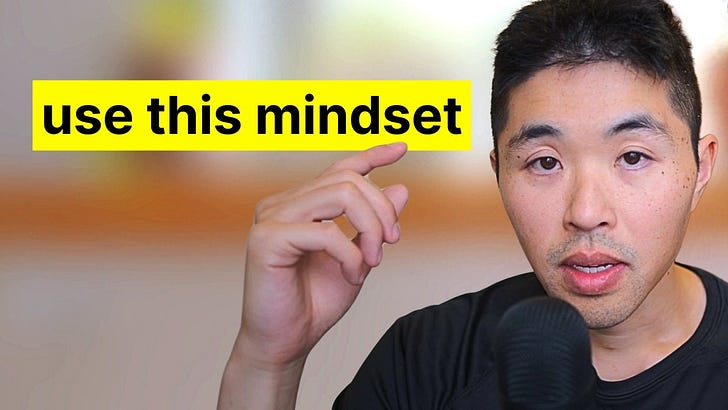Learning Chinese Is Easy If You Avoid These Traps
How to learn Mandarin Chinese fast by avoiding common traps that hurt your progress.
Learning Chinese is fun and easy in the beginning.
But eventually reality sets in, and it's like we're learning on hard mode...
Life gets in the way. Work. Responsibility.
We start comparing ourselves to others.
Self-doubt kicks in and we lose motivation and progress.
The cause?
We’re falling for hidden traps.
And most of these are self-imposed.
Here are the most common traps I experienced learning Chinese and I see other learners fall into.
The Comparison Trap.
You watch a YouTube video and think, “Wow, their pronunciation is perfect,” or “They’re so fluent, why can’t I be like that?”
This leads to self-doubt, negative self-talk and maybe decreased motivation to continue learning.
Comparing yourself with other learners is dangerous.
You don't know how much time they recited that phrase. You don't know how many takes they did. You don't know all the takes they cut out.
Social media and online videos do not reflect real life. These platforms are designed to increase the time you spend on them by spiking your dopamine with flashy cuts and outrageous reactions.
The content that goes viral presents a glamorized and unrealistic version of reality so that you get a dopamine rush, but then feel shitty after, so you're craving more.
You start to compare yourself to others, question yourself, and your confidence tanks.
When you’re constantly comparing yourself with unrealistic expectations, you lose sight of what really matters: your personal wins and growth.
Everyone’s journey is different. Some people might pick up tones faster; others might have a knack for vocabulary.
It fine to draw inspiration and motivation from others, but when comparison takes away from your learning and motivation, this is a problem.
Other people's journey says nothing about your skills, abilities and value as a person.
Learning Chinese is not a competition.
It's more like a game. And the goal is not to win, but to continue playing.
Every day we get to learn is a good day.
The Performance Trap.
Another trap is treating every conversation as a performance. This mindset can paralyze you with fear of making mistakes.
For instance, when I first moved to Taiwan, I often hesitated to speak Mandarin. I worried about my pronunciation and feared judgment from native speakers.
Over time, I realized that this fear was holding me back.
The key is to approach language learning with a sense of play. Treat conversations as opportunities to experiment and learn, not as tests of your abilities.
When you stop treating speaking as a performance, you free yourself to make mistakes—and mistakes are essential for growth.
Embrace the process, laugh at your blunders, and enjoy the journey.
The Compliment Trap.
Compliments can be a double-edged sword.
On one hand, it’s great to hear, “Wow, your Chinese is so good!” or "You sound like a native speaker!"
But if you're not cautious, you can let it get to your head and it can inflate your ego.
You start to build an image in your head of how you should sound like. And you don't want to shatter the false expectations that others have placed on you.
That’s where the pressure starts to build and you start to walk on eggshells.
I know because this happened to me and my progress hit a wall.
But it's not the person giving the compliment's fault. Compliments are well-intentioned.
We have to be careful as language learners not to fall for this common trap.
We should remember why we are learning Chinese. What is our 初心?
My motivations are not to garner superficial and temporary compliments.
My motivation is to continue learning the weird quirks of this language and develop kick-ass relationships because of it.
And I know the only way to do that is to continue to challenge myself and make mistakes along the way.
And not to hid behind the veil of compliments without making mistakes.
Practical Tips To Avoid These Traps.
1. Lower Your Expectations:
Don’t treat speaking like a performance. Instead, verbalize your weaknesses and what you’re self-conscious about when you’re speaking.
For example, tell the other person, “I’m still learning this language,” or, “I’m not confident with my tones yet.”
You’ll be surprised how willing people are to help, and this shift will make you less afraid to make mistakes.
2. Set Small, Manageable Goals:
Avoid overwhelming yourself with huge, unattainable goals.
Instead, aim for something realistic—like listening to 30 minutes of content a day, even passively, or learning just one new word a day.
Speak for just one minute daily. Most days, you’ll naturally want to go beyond these small goals because they’re so easy to start.
3. Avoid Comparison:
Be mindful of the media you consume.
Think of it as a diet—limit social media that makes you compare yourself to others or feel bad about your progress.
Instead, focus on resources that inspire and encourage you.
4. Treat It Like a Game:
Make learning fun and sustainable. Treat it like a sport or a game where the goal isn’t to win but to keep playing.
Celebrate small wins, like a compliment from someone, but don’t make “winning” the goal.
Enjoy the journey and the opportunities to talk, connect, and grow.
Hope this helps you.
加油,
Danyo
PS Here are some ways I can help you:
Copy Paste Speak Course: The science-backed system I used to effortlessly understand Chinese speakers, quickly build native vocabulary and have confident conversations in Mandarin.
Chinese Speakers Community: I help you level up your Mandarin speaking faster so you can talk about what you want in 30 minutes a day. You get all my courses, trainings, exercises and personalized feedback.



